 Continuing the analysis of the Abu Ghraib torture scandal....
Continuing the analysis of the Abu Ghraib torture scandal.... Continuing the analysis of the Abu Ghraib torture scandal....
Continuing the analysis of the Abu Ghraib torture scandal....
Iraqi prison no aberration
We can be confident that Abu Ghraib wasn't an aberration because the same things happen in US prisons—especially in conservative states like Texas run by governors like George W. Bush. From the Los Angeles Times, 5/6/04:
COMMENTARY
Exporting America's Shame
* Allegations in Iraq reflect the violent, abusive prisons that have arisen in the U.S.
By Robert L. Bastian Jr.
Robert L. Bastian Jr. is a Los Angeles lawyer.
President Bush has asserted that the abuse of Iraqi prisoners at Abu Ghraib "does not reflect the nature of the American people."
"That's not the way we do things in America," he added.
In terms of aspirations, Bush is certainly correct: Americans generally do not regard themselves as arrogant, abusive, violent, mean, petty and ignoble. As a matter of empirical, verifiable fact, however, the best social scientific evidence suggests that the president is simply wrong on both counts.
In 1971, for example, Stanford psychology professor Philip G. Zimbardo initiated an experiment in which participating Stanford students were designated either as prisoners or guards, with guards told to maintain order. After only a few days, the project had to be terminated prematurely because the guards were, with no apparent motivation other than fulfilling their roles, becoming uncomfortably abusive toward the prisoners. What does that say about our "nature"?
In another famous experiment, Yale psychology professor Stanley Milgram told subjects to give electric shocks to a victim in a learning experiment. As the victim — an actor in another room who was not actually being shocked — gave incorrect answers, the participants were asked to turn the voltage up, even to where the dial read "danger," a point at which the victim could be heard screaming. Although often reluctant, two-thirds of the subjects continued to follow orders to administer shocks.
Given that, what's so surprising about the fact that in 2004, reservists controlling the relevant tier in Abu Ghraib prison would — in an effort to follow orders — agree to "soften" the Iraqi detainees for questioning?
If the president was wrong about the nature of the American people, he was no less wrong about the way things are done by Americans.
At the outset of the occupation, it was earnestly argued that the Iraqi people would welcome and benefit from imposition of U.S.-style democracy and freedoms. The American public — and, I suspect, most of the world — believed that Americans could do a better job of running a prison such as Abu Ghraib. We're not arbitrary, abusive, unaccountable or unjust, right? Indeed, last June, Brig. Gen. Janis Karpinski told a reporter that Americans were making living conditions so much better at Abu Ghraib that she was concerned prisoners "wouldn't want to leave."
But again, we are deluding ourselves. The hard fact is that the U.S. did install in Iraq an American-style approach to prison management. Like the U.S. prison system, it is underfunded and inadequately supervised, lacks civilian oversight and accountability and is secretive and tolerant of inmate abuse until evidence of mistreatment is pushed into the public light. That, regrettably, is the American model.
Over the last four decades, political leaders here at home have committed themselves to incarcerating inmates at rates that ultimately rivaled the former Soviet Union and repressive Middle Eastern regimes. Prisons have grown overcrowded and understaffed.
At the same time, there has been no commensurate commitment to protecting prisoner rights or upholding even minimal standards. Both state and federal legislatures, with the complicity of federal courts, have continually trimmed avenues of legal redress for inmates subject to abuse.
For its part, the public was fed the myth that prisoners were coddled, and accepted on faith that inmates were treated fairly. The public faith was interrupted only when graphic images materialized as evidence or by guards "rolling over."
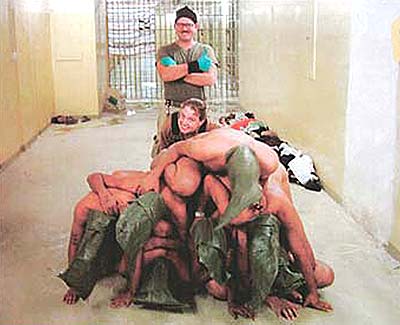
Regarding Abu Ghraib, testimonial evidence of abuse was reported by no fewer than half a dozen organizations, including Human Rights Watch and Amnesty International. Until photos were shown on "60 Minutes II," though, they were merely allegations and, therefore, not the subject of public concern and remedial action.
So, what has been shown in Abu Ghraib that has not already been seen in the U.S.? Recently, images of cages in which California Youth Authority wards were locked up for as much as 23 hours a day were broadcast. In 2001, Human Rights Watch reported in detail how extensively rape is tolerated in U.S. prisons.
The Eddie Dillard case, in which I represented the inmate, revealed a paper trail with respect to one prolific cell rapist responsible for more than 30 reported incidents of attempted or completed sexual assaults at six different California prisons. Still, the predator was assigned more cellmates.
The accumulated result: A federal district court judge in Northern California has threatened to take over the California Department of Corrections because it can't break the code of silence among its guards and take responsibility for the integrity of its mission.
In the last decade, the department has restricted visits by family and journalists to the remote locations where prisons have been scattered, on the ground that the press might glamorize prison life. Or has it acted to impede reporting of underfunding and abuse?
In the shadow of the infamous Abu Ghraib photographs, it's easy to understand why much of the world looks upon Americans as craven and arrogant. In so many ways, the United States' interests and international image have been harmed as we act on our aspirations and self-congratulatory beliefs instead of a cold, hard view of reality, including our own limitations.
No less a figure than Winston Churchill famously said that "treatment of crime and criminals is one of the most unfailing tests of civilization of any country." If Churchill is right, so, at the moment, are America's critics.
More on our prison failures
From the NY Times:
Mistreatment of Prisoners Is Called Routine in U.S.
By FOX BUTTERFIELD
Published: May 8, 2004
Physical and sexual abuse of prisoners, similar to what has been uncovered in Iraq, takes place in American prisons with little public knowledge or concern, according to corrections officials, inmates and human rights advocates.
In Pennsylvania and some other states, inmates are routinely stripped in front of other inmates before being moved to a new prison or a new unit within their prison. In Arizona, male inmates at the Maricopa County jail in Phoenix are made to wear women's pink underwear as a form of humiliation.
At Virginia's Wallens Ridge maximum security prison, new inmates have reported being forced to wear black hoods, in theory to keep them from spitting on guards, and said they were often beaten and cursed at by guards and made to crawl.
The corrections experts say that some of the worst abuses have occurred in Texas, whose prisons were under a federal consent decree during much of the time President Bush was governor because of crowding and violence by guards against inmates. Judge William Wayne Justice of Federal District Court imposed the decree after finding that guards were allowing inmate gang leaders to buy and sell other inmates as slaves for sex.
The experts also point out that the man who directed the reopening of the Abu Ghraib prison in Iraq last year and trained the guards there resigned under pressure as director of the Utah Department of Corrections in 1997 after an inmate died while shackled to a restraining chair for 16 hours. The inmate, who suffered from schizophrenia, was kept naked the whole time.
The Utah official, Lane McCotter, later became an executive of a private prison company, one of whose jails was under investigation by the Justice Department when he was sent to Iraq as part of a team of prison officials, judges, prosecutors and police chiefs picked by Attorney General John Ashcroft to rebuild the country's criminal justice system.
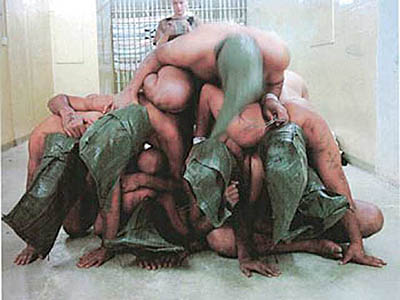
Mr. McCotter, 63, is director of business development for Management & Training Corporation, a Utah-based firm that says it is the third-largest private prison company, operating 13 prisons. In 2003, the company's operation of the Santa Fe jail was criticized by the Justice Department and the New Mexico Department of Corrections for unsafe conditions and lack of medical care for inmates. No further action was taken.
In response to a request for an interview on Friday, Mr. McCotter said in a written statement that he had left Iraq last September, just after a ribbon-cutting ceremony to open Abu Ghraib.
"I was not involved in any aspect of the facility's operation after that time," he said.
Nationwide, during the last quarter century, over 40 state prison systems were under some form of court order, for brutality, crowding, poor food or lack of medical care, said Marc Mauer, assistant director of the Sentencing Project, a research and advocacy group in Washington that calls for alternatives to incarceration.
In a 1999 opinion, Judge Justice wrote of the situation in Texas, "Many inmates credibly testified to the existence of violence, rape and extortion in the prison system and about their own suffering from such abysmal conditions."
In a case that began in 2000, a prisoner at the Allred Unit in Wichita Falls, Tex., said he was repeatedly raped by other inmates, even after he appealed to guards for help, and was allowed by prison staff to be treated like a slave, being bought and sold by various prison gangs in different parts of the prison. The inmate, Roderick Johnson, has filed suit against the Texas Department of Criminal Justice and the case is now before the United States Court of Appeals for the Fifth Circuit in New Orleans, said Kara Gotsch, public policy coordinator for the National Prison Project of the American Civil Liberties Union, which is representing Mr. Johnson.
Asked what Mr. Bush knew about abuse in Texas prisons while he was governor, Trent Duffy, a White House spokesman, said the problems in American prisons were not comparable to the abuses exposed at Abu Ghraib.
The corrections experts are careful to say they do not know to what extent the brutality and humiliation at Abu Ghraib were intended to break the prisoners for interrogation or were just random acts.
But Chase Riveland, a former secretary of corrections in Washington State and Colorado and now a prison consultant based near Seattle, said, "In some jurisdictions in the United States there is a prison culture that tolerates violence, and it's been there a long time."
This culture has been made worse by the quadrupling of the number of prison and jail inmates to 2.1 million over the last 25 years, which has often resulted in crowding, he said. The problems have been compounded by the need to hire large numbers of inexperienced and often undertrained guards, Mr. Riveland said.
Some states have a hard time recruiting enough guards, Mr. Riveland said, particularly Arizona, where the pay is very low. "Retention in these states is a big problem and so unqualified people get promoted to be lieutenants or captains in a few months," he said.
Something like this process may have happened in Iraq, where the Americans tried to start a new prison system with undertrained military police officers from Army reserve units, Mr. Riveland suggested.
Prison culture reflects American culture
Not surprisingly, the prison culture, both in Abu Ghraib and the US, reflects the values of the people who run the prisons. From the LA Times, 5/10/04:
COMMENTARY
'Bad Apples' or Predictable Fruits of War?
By Michael Massing
"A few bad apples" is Washington's insistent message to the rest of the world in trying to explain the appalling images out of Abu Ghraib prison. While sharing in the worldwide horror at the photos, Americans have rushed to assert that we are "a compassionate country that believes in freedom" and "cares about every individual," as President Bush put it in his interviews on Arab television.
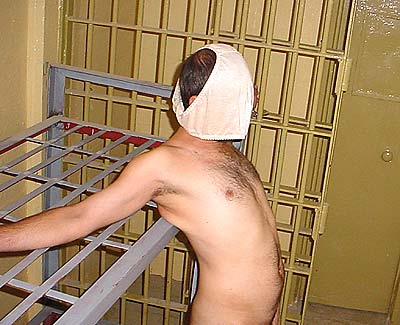
The rest of the world is not having it. From Paris to Riyadh to New Delhi, commentators are insisting that these acts are not exceptions but part of a pattern of American arrogance and brutishness.
"The torture is not the work of a few American soldiers," a columnist in the London-based Al-Quds Al-Arabi newspaper wrote. "It is the result of an official American culture that deliberately insults and humiliates Muslims." Over and over, American acts in Iraq have been equated with those of Saddam Hussein — a comparison Americans find absurd and infuriating.
How to explain this discrepancy? Is the rest of the world deluded, or are we? Have others been propagandized, or have we? The Bush administration and its backers have frequently pointed the finger at Arab satellite networks such as Al Jazeera and Al Arabiya, charging them with casting all U.S. actions in the worst possible light. Any fair-minded viewer of these networks would have to acknowledge the merit in these complaints. Though resourceful and enterprising, these networks appeal to an Arab nationalism and pride that views the U.S. occupation as inherently illegitimate, and their broadcasts reflect this. Hour upon hour, they beam images of American soldiers ransacking homes; of men and boys being marched off in handcuffs and hoods while their wives and mothers stand by wailing; of hospital beds full of children missing limbs, eyes and hope. So when photos of Americans abusing Iraqi prisoners are released, they're seen as part of a pattern.
But Americans have been fed their own highly skewed version of reality. It's rooted in the idea of American "exceptionalism," of our unique mission to inspire and transform the world. This vision goes back to Abraham Lincoln, who spoke of the United States as the "last best hope of Earth." John F. Kennedy urged us to "pay any price, bear any burden, meet any hardship" to promote liberty. Ronald Reagan cast the U.S. as a "shining city on a hill," illuminating the world by its example. And George W. Bush has repeatedly proclaimed his belief that the U.S. — led by Providence — has "an obligation to unleash freedom in the world," as he put it in a recent speech.
Such rhetoric can have benevolent results. It has spawned the Peace Corps, moved mountains of food aid and promoted the spread of human rights. It helped carry out the Marshall Plan, bring down the Berlin Wall and stop "ethnic cleansing" in Bosnia and Kosovo.
But such talk can also be dangerous. It has led us into the swamps of Vietnam, the jungles of Central America, the deserts of Iraq. Mesmerized by our idealism, we have averted our gaze from war's realities — the razed villages, the death squads, the barbarities of occupation.
Bush sought to justify war in Iraq on the ground that it would not only make Americans safer but also make Iraqis freer. The Middle East, he declared, would be transformed and democratized through our intervention. While flattering our sense of national purpose, such claims foreclosed discussion of the potential costs of invading and occupying an Arab country.
During the war itself, while Arab and European news organizations unflinchingly presented images of the dead and injured, the American networks — worried, as always, about viewer sensibilities — scrubbed their broadcasts of all signs of blood. The decision of some newspapers to publish photos of flag-draped coffins caused an uproar. So did Ted Koppel's decision to read the names of the fallen on "Nightline." When the Sinclair Broadcast Group announced that its stations would not air the program, it fell to a war-hardened veteran like Sen. John McCain to note the need for the public "to be reminded of war's terrible costs, in all their heartbreaking detail."
At least U.S. casualties are finally getting some attention. Iraqi casualties are not. The U.S. military does not track them, and U.S. news organizations rarely report on them. The recent fighting in Fallouja is a good example. After four American security contractors were killed and their bodies mutilated, the U.S. military pounded the city with warplanes and gunships. By most accounts, hundreds of people died, many of them civilians.
Al Jazeera showed nonstop footage of these victims, searing them into the Arab psyche. On American TV, they were barely a blip, and, two weeks later, we still have no idea how many civilians died. And we don't seem to care.
Such indifference reflects a broader lack of curiosity about the world. Americans, in an act of great national narcissism, are forever polling other nations to see what they think of us. Our ratings keep going down, but do we ever stop to find out why?
We are notorious for our lack of knowledge of other cultures, our inability to speak foreign languages. Overwhelmingly, the generals and administrators in Iraq cannot speak Arabic, cannot tell a Sunni from a Shiite. How do you liberate people when you can't even communicate with them?
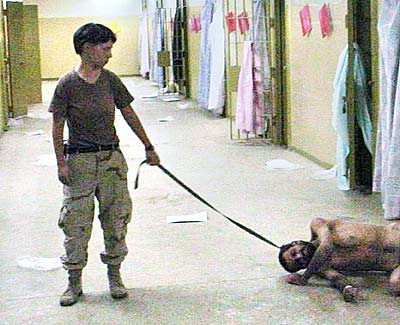
The photos out of Abu Ghraib have finally pierced the screen of our complacency and self-regard. They have forced us to confront the fact that war brutalizes — and not only the vanquished. The guards who shackled and stripped the Iraqi prisoners may be bad apples, but they are the predictable fruit of an expanding American imperium. We must recognize that those smirking grins and sadistic leers are not simply expressions of some alien breed — they are the face of America at war.
*
Michael Massing is a contributing editor of the Columbia Journalism Review and a frequent contributor to the New York Review of Books.
A reader comments:
Thank you so very much for this posting.
Yet I have one pressing question. Why is it so hard for so many in the United States to acknowledge the brutality, the inhumanity, of U.S. military forces when the history of this country is founded and built on the blood, bones, and over-worked bodies of conquered and enslaved peoples of color??!! When will Whites who comprise the working class awaken to their own exploitation? What is coming to light now is simply the reality of so many people that has been conveniently obscured by pundits, politicians, and scholars trained to obfuscate more than they illuminate of U.S. reality. As Aretha Franklin has so often queried in her music, "Who's foolin' who?"
Sincerely,
M. Thandabantu Iverson
Indiana University Northwest
Division of Labor Studies
Our smug self-confidence
We're smugly confident that we're God's gift to the world—that we can defeat any opponent or obstacle, even nature itself. If we're superior, everyone else must be inferior, naturally. Hence our harsh treatment of Indians, blacks, Jews, and other ethnic and religious minorities. If we don't keep them in their place, goes the thinking, they'll rise up and take what's rightfully ours.
From the Washington Post:
Images
A Wretched New Picture of America
Photos From Iraq Prison Show We Are Our Own Worst Enemy
By Philip Kennicott
Washington Post Staff Writer
Wednesday, May 5, 2004; Page C01
Among the corrosive lies a nation at war tells itself is that the glory — the lofty goals announced beforehand, the victories, the liberation of the oppressed — belongs to the country as a whole; but the failure — the accidents, the uncounted civilian dead, the crimes and atrocities — is always exceptional. Noble goals flow naturally from a noble people; the occasional act of barbarity is always the work of individuals, unaccountable, confusing and indigestible to the national conscience.
This kind of thinking was widely in evidence among military and political leaders after the emergence of pictures documenting American abuse of Iraqi prisoners in Abu Ghraib prison. These photographs do not capture the soul of America, they argued. They are aberrant.
This belief, that the photographs are distortions, despite their authenticity, is indistinguishable from propaganda. Tyrants censor; democracies self-censor. Tyrants concoct propaganda in ministries of information; democracies produce it through habits of thought so ingrained that a basic lie of war — only the good is our doing — becomes self-propagating.
But now we have photos that have gone to the ends of the Earth, and painted brilliantly and indelibly, an image of America that could remain with us for years, perhaps decades. An Army investigative report reveals that we have stripped young men (whom we purported to liberate) of their clothing and their dignity; we have forced them to make pyramids of flesh, as if they were children; we have made them masturbate in front of their captors and cameras; forced them to simulate sexual acts; threatened prisoners with rape and sodomized at least one; beaten them; and turned dogs upon them.
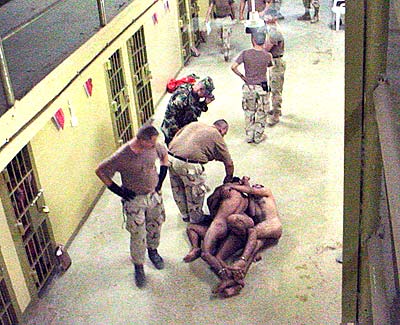
There are now images of men in the Muslim world looking at these images. On the streets of Cairo, men pore over a newspaper. An icon appears on the front page: a hooded man, in a rug-like poncho, standing with his arms out like Christ, wires attached to the hands. He is faceless. This is now the image of the war. In this country, perhaps it will have some competition from the statue of Saddam Hussein being toppled. Everywhere else, everywhere America is hated (and that's a very large part of this globe), the hooded, wired, faceless man of Abu Ghraib is this war's new mascot.
The American leaders' response is a mixture of public disgust, and a good deal of resentment that they have, through these images, lost control of the ultimate image of the war. All the right people have pronounced themselves, sickened, outraged, speechless. But listen more closely. "And it's really a shame that just a handful can besmirch maybe the reputations of hundreds of thousands of our soldiers and sailors, airmen and Marines. . . . " said Gen. Richard B. Myers, chairman of the Joint Chiefs of Staff on Sunday.
Reputation, image, perception. The problem, it seems, isn't so much the abuse of the prisoners, because we will get to the bottom of that and, of course, we're not really like that. The problem is our reputation. Our soldiers' reputations. Our national self-image. These photos, we insist, are not us.
But these photos are us. Yes, they are the acts of individuals (though the scandal widens, as scandals almost inevitably do, and the military's own internal report calls the abuse "systemic"). But armies are made of individuals. Nations are made up of individuals. Great national crimes begin with the acts of misguided individuals; and no matter how many people are held directly accountable for these crimes, we are, collectively, responsible for what these individuals have done. We live in a democracy. Every errant smart bomb, every dead civilian, every sodomized prisoner, is ours.
And more. Perhaps this is just a little cancer that crept into the culture of the people running Abu Ghraib prison. But stand back. Look at the history. Open up to the hard facts of human nature, the lessons of the past, the warning signs of future abuses.
These photos show us what we may become, as occupation continues, anger and resentment grows and costs spiral. There's nothing surprising in this. These pictures are pictures of colonial behavior, the demeaning of occupied people, the insult to local tradition, the humiliation of the vanquished. They are unexceptional. In different forms, they could be pictures of the Dutch brutalizing the Indonesians; the French brutalizing the Algerians; the Belgians brutalizing the people of the Congo.
Look at these images closely and you realize that they can't just be the random accidents of war, or the strange, inexplicable perversity of a few bad seeds. First of all, they exist. Soldiers who allow themselves to be photographed humiliating prisoners clearly don't believe this behavior is unpalatable. Second, the soldiers didn't just reach into a grab bag of things they thought would humiliate young Iraqi men. They chose sexual humiliation, which may recall to outsiders the rape scandal at the Air Force Academy, Tailhook and past killings of gay sailors and soldiers.
Is it an accident that these images feel so very much like the kind of home made porn that is traded every day on the Internet? That they capture exactly the quality and feel of the casual sexual decadence that so much of the world deplores in us?
Is it an accident that the man in the hood, arms held out as if on a cross, looks so uncannily like something out of the Spanish Inquisition? That they have the feel of history in them, a long, buried, ugly history of religious aggression and discrimination?
Perhaps both are accidents, meaningless accidents of photographs that should never have seen the light of day. But they will not be perceived as such elsewhere in the world.
World editorial reaction is vehement. We are under the suspicion of the International Red Cross and Amnesty International. "US military power will be seen for what it is, a behemoth with the response speed of a muscle-bound ox and the limited understanding of a mouse," said Saudi Arabia's English language Arab News.
We reduce Iraqis to hapless victims of a cheap porn flick; they reduce our cherished, respected military to a hybrid beast, big, stupid, senseless.
Last year, Joel Turnipseed published "Baghdad Express," a memoir of the first Gulf War. In it, he remembers an encounter with Iraqi prisoners. A staff sergeant is explaining to the men the rules of the Geneva Convention.
" . . . What that means, in plain English, is 'Don't feed the animals' and 'Don't put your hand in the cage.' "
And then, the author explains, the soldiers proceed to break the rules. The ox thinks like a mouse.
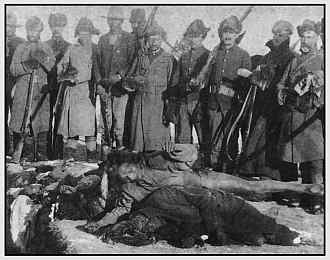
"My vanquished were now vanquishing me," wrote Turnipseed, heartsick.
Not quite 50 years ago, Aime Cesaire, a poet and writer from Martinique, wrote in his "Discourse on Colonialism": "First we must study how colonization works to decivilize the colonizer, to brutalize him in the true sense of the word, to degrade him, to awaken him to buried instincts, to covetousness, violence, race hatred, and moral relativism."
Are we decivilized yet? Are we brutes yet? Of course not, say our leaders.
© 2004 The Washington Post Company
A Native comments
Kennicott didn't mention America's abuse of its Native inhabitants, but he might as well have. Ishgooda makes the connection:
The sad fact is, anyone truly familiar with the history of this nation can never repress the truth that this has consistently been the behavior of a colonialist army toward those it subjugates. One only need think of Col. Chivington, Andrew Jackson, Col. Custer and a host of others who sought to exterminate our peoples upon this continent. Women were raped, infants dashed against rocks, and women's private parts cut out to adorn saddles. Children were shipped across country, their hair cut and forbidden to speak their language of birth, torn from family and tribe. There was a bounty on scalps and hides of our people as though they, like bear and beaver were another beast of the field and forest.
Like then, the "gentle" folk of the east didn't wish to know of the gory details. What they turned a deaf ear to was reality. What they taught their children was the myth of daring noble settlers who sought to tame an unoccupied "wild west".
The only change with the current news is the "image", as "America the Benevolent" gets harder to maintain. The reality of its existence has not.
Arrogance is ultimate cause
Abuse of prisoners, attacks on villages, invasions of countries, the whole "war on terrorism"...all these stem from our racial and cultural arrogance. Arabs and Muslims are just the latest victims of the white Christian superiority complex that surfaced in 1492 and has continued ever since.
Racism at Core of Iraq Invasion
By Firas Al-Atraqchi, firascape@hotmail.com, IslamOnline, 2004-04-29
The popular perception in the US is that Iraq is a country of uncivilized criminals and terrorists raised to hate America because common people hate freedom and liberty, "ragheads" and "sand niggers" who brought down the Twin Towers in New York City and attacked the Pentagon. US-based columnists have taken to calling Iraqis lazy and ungrateful. A few days ago, in a prime-time press conference, US President George Bush said the Iraqis must take control of their own destinies come June 30th.
The fact that many of the kidnapped foreign workers were Pakistanis, Bangladeshis and other Asians who used to drive cars and trucks should get the message across that everyone is allowed a job in Iraq -- except the Iraqis. Take Coalition Provisional Authority head L. Paul Bremer who issued Order 39 (September 19), which declares that 100 percent ownership of Iraqi banks, mines and factories is allowed to be foreign-owned and 100 percent of profits from these Iraqi institutions is allowed to be moved out of the country. Where do Iraqis fit in? Is it any surprise they feel cheated and robbed? Does a robbed man stand by and watch his possessions dwindle?
This is the ignorance that is supported, endorsed, encouraged and tolerated by everyone from the Bush administration down to every major news outlet in the US.
Take for example the handling of the four Americans who were killed in Fallujah, had their corpses burned, dismembered and then hanged on a bridge. Every news outlet in the US spoke of the four heroic American "civilians." Iraqis butchered four decent, law-abiding civilians. Civilians who left their families in helping to rebuild Iraq . That is the version the American public is given.
However, the truth is that the four were former US soldiers in various capacities working as security agents for North Carolina-based Blackwater Corp, which — among other things — is charged with protecting L. Paul Bremer. Secondly, it is no secret that many of the operations the US military used to undertake have now been slated for private security firms like Blackwater.
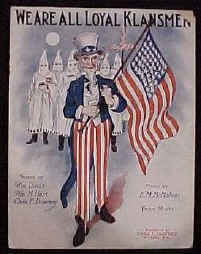
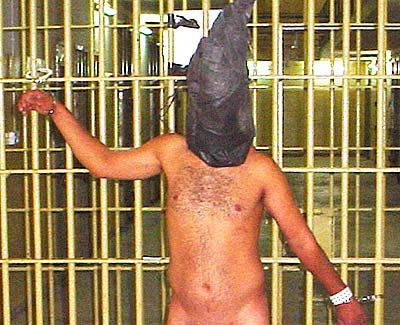
Effectively, they are hired help -- mercenaries. One of them was a Navy Seal, one of the most decorated and highly-trained outfits in the US Military. Missing from the national (and international) discussion are the reports which cited weapons found on the four slain men. Anyone who has seen news footage of the private security firms running about in Iraq will immediately recognize that they are armed to the teeth, wearing flak jackets. Initial reports said that the corpses were wearing blue-colored flak jackets.
The "civilians" theory doesn't hold much water.
In fact, and unreported to US audiences, private security firms in Iraq, much like Blackwater, are taking over major tasks and operations primarily assigned to US forces. The hope is that US forces remain in barracks, avoid improvised explosive devices and ambushes, reduce the body count, and keep the US public firmly behind the war. In effect, private security firms have become the de facto military presence in Iraq — vastly outnumbering the official count of Coalition forces.
If the US Military is considered the occupying force in Iraq and is replaced by what can be considered a mercenary force -- bought and paid for to undertake military duties -- then the private security firms become legitimate targets for a populace that feels itself occupied and bound to resist.
And that is precisely what several dozen clerics in Iraq and the Arab world said. They did not condemn the right to attack the four armed men -- remember, they were armed -- but did strongly condemn in unmistakable terms the mutilations and public hangings that occurred later. Islamic law strictly prohibits the maiming or disrespecting of any dead body, even that of an animal. According to the Prophet Mohammed, even spitting at a dead body -- whether it is of an enemy or ally, Jew, Christian, or Muslim is irrelevant -- is considered sacreligious. The Prophet routinely stood up in respect as the funeral procession of Jews and Christians passed by his domicile. However, this little tidbit about what is permissible and prohibited in Islam was left out of US reporting.
A full week after the killing of the four Blackwater employees, more than 700 people have been killed in Fallujah. There are more than 2,000 wounded civilians. More than 147 houses have been entirely destroyed. Four mosques have been damaged. Doctors are running out of vital supplies. The city is under siege, cut off from food, water, and medicine supplies. "We are resorting to collective punishment," Newsweek editor Fareed Zakaria told Chris Matthews on Hardball recently. He denied the official US position that fighters in the "Sunni Triangle" are dead-enders. He also claimed uneven-handedness in Iraq was feeding the "insurgency."
Punitive collective punishment of this kind is reminiscent of German Nazi policies during the occupation of France . Take for example the German Nazi response in the French town of Tulle in 1944. History shows that French Resistance had seized the town of Tulle from the German 3rd Battalion and 95th Security Regiment. When the Das Reich Panzer Division retook the town, they found 64 badly-mutilated German bodies. Revenge would come swiftly: The SS-Panzer Aufklarungs Abteilung 2 platoon seized 99 men and promptly executed them, later hanging their bodies as a sign to others. Some 100 civilians who were deported to concentration camps would die in Germany.
To the Germans, the civilians were "insurgents and terrorist sympathizers"; to the rest of the world, they were civilians. For its part, the French resistance fighters were not called terrorists; they were called La Resistance (the resistance) and adopted a near mythical, if not legendary, status in European history.
As civilian casualties escalate into the hundreds, US Military commanders, hoping to save face in Iraq and the Arab World, have started to accuse the defenders of Fallujah of hiding behind women and children. That statement flies in the face of video footage shot by Al Jazeera and carried on ABC, CBS, MSNBC, and NBC clearly showing Iraqi fighters running between streets, in trenches, atop buildings, firing their RPGs and automatic weapons. No women and children in sight.
When a large convoy of aid supplies carrying blood for hospital transfusions, food, and water managed to break through a US military roadblock, the media called it a delivery of aid to Sunni rebels. Missing from the report were mentions of doctors feeling overwhelmed and ill-equipped to deal with the growing death toll and the number of civilians facing a humanitarian crisis due to lack of drinkable water and unspoiled food (Fallujah was dependent on shipments from the rest of Iraq).
On April 12, as Arab journalists (including Iraqi journalists) pressed the Coalition to comment on civilian deaths in Fallujah , US General Mark Kimmit refused to acknowledge that it was civilians who were killed. US Media swallowed it hook, line and sinker with MSNBC reporting "U.S. officials say about 700 insurgents and 70 coalition troops have been killed since April 1, but Iraqi civilian toll is unclear." Despite persistent reports from Al Jazeera and other Arab media, despite the graphic pictures of women and children cut to pieces, despite the angry wails of hospital staff and appeals for humanitarian assistance, US media is refusing to toe anything but the official government line.
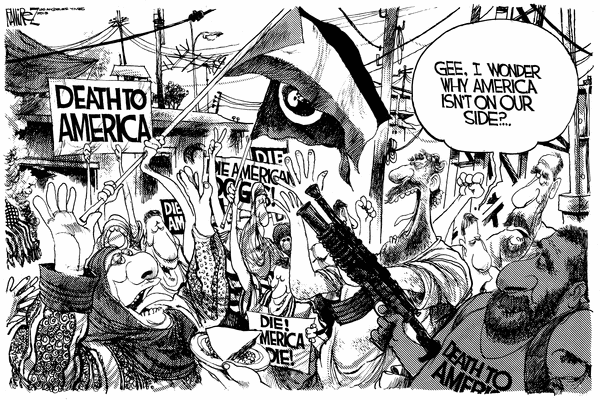
Isn't that how the fabrications, reliance on unreliable defectors, and other misconceptions about Iraq 's WMD were propagated in the first place? What of the Iraq-Al Qaeda link, which has since been debunked? Was it not US media that reported every "official" word coming out of the Bush administration and various Washington think-tanks as gospel?
Why?
Racism is the answer. There is an arrogance in the West that everything Western is superior, exemplary and ideal for all cultures. In 2002, Italian Prime Minister Silvio Belusconi said that Islamic culture was inferior to the advanced Western civilization. This school of thought is prevalent throughout every sector of US society and has been nudged on by the various "hate-films" that Hollywood churns every year. Arabs are portrayed as stupid, animalistic, ammoral, sex-starved, abusing, wife-battering terrorists who seek to kill themselves -- and their children -- so that they can languish with 72 virgins in heaven. That Arabs saved Western civilization by translating the Greek philosophies and complementing them, introducing algebra, geometry and astronomy to Europe is left out. That the first medical institute in world history was established in -- wait for it -- southern Iraq by the Muslims is also lost on the US public.
It is no surprise then when we hear that British commanders in Iraq were condemning the Americans' heavy-handed and disproportionate military tactics in Iraq . According to The Telegraph's Sean Rayment, a British officer, who agreed to the interview on the condition of anonymity, said that part of the problem was that American troops viewed Iraqis as 'untermenschen' -- the Nazi expression for ‘sub-humans'.
"They are not concerned about the Iraqi loss of life in the way the British are. Their attitude towards the Iraqis is tragic, it's awful." The British officer accused the US Military of targeting "terrorists" even if they are located in densely-populated civilian areas: "They may well kill the terrorists in the barrage but they will also kill and maim innocent civilians. That has been their response on a number of occasions. It is trite, but American troops do shoot first and ask questions later. They are very concerned about taking casualties and have even trained their guns on British troops, which has led to some confrontations between soldiers," The Telegraph reported.
By the way, if you weren't around during the Nazi purging of Europe's Jews, "untermenschen" is the popular term a certain Adolf Hitler used to express his disdain for what he termed the "inferior" Jews in Mein Kamp.
Consequently, if the US Military, which can be considered the military hand of the US government, considers Iraqis as inferior beings, it is then academic to extrapolate that US lawmakers view Iraqis as lesser peoples. Perhaps that helps explain why the Bush administration is so irked by news reports showing dead Iraqi women and children. Perhaps it helps explain why he accuses Arab media — including Al Jazeera and Al Arabiya — of being propagandists and liars. Perhaps it also explains why every Iraqi protestation in the last few years about lack of WMDs was shot down by US media and Iraqi officials were branded expert liars.
Perhaps, it also explains why "the axis of evil" slogan was so popular with Washington neocons. Inferior people are considered satanic and evil. After all, was this not how slavery was maintained and thrived in the continental US in the 17th, 18th, 19th, and 20th centuries? Were not the slaves considered by white (supremacist) landowners to be cursed by God, soulless and would never see the gates of heaven? Was this not how Apartheid was allowed to survive in the heart of black Africa?
Racism. The same racism that allowed 800,000 Rwandan Hutus and Tutsis to die exactly 10 years ago while the so-called compassionate superpower focused on twiddling their thumbs. The same racism that refused to apologize for centuries of slavery at the Durban Conferences in South Africa on September 8, 2001.
Zakaria put it best when he told Matthews how Iraqis must feel: "We lost four on our side and they lost 700. What do you think that tells them? That their lives are not nearly as important?"
Touché.
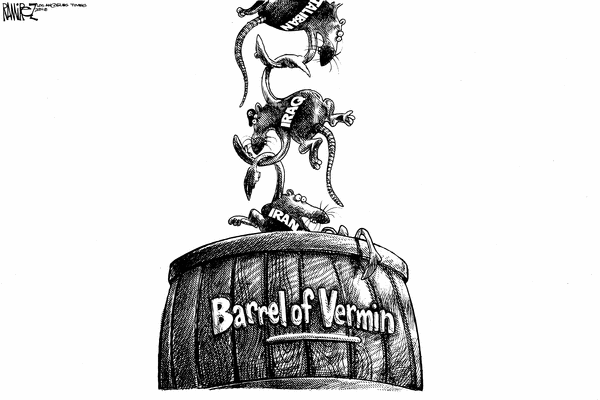
Media Beat
This War and Racism
By Norman Solomon
Among the millions of words that have appeared since late April about abuse and torture at the Abu Ghraib prison in Iraq, one has been notably missing: racism.
Overall, when it comes to racial aspects, the news coverage is quite Pentagon Correct. The outlook is "apple pie" egalitarian, with the media picture including high-profile officers who are African American and Latino. Meanwhile, inside the policy arena, Colin Powell and Condoleezza Rice are frequently in front of cameras to personify Uncle Sam in blackface.
The U.S. government doesn't drop bombs on people because of their race. Washington's geo-political agendas lead to military actions. But racial biases make the war process easier when the people being killed and maimed aren't white people. An oversize elephant in the U.S. media's living room is a reality that few journalists talk about in public: The U.S. keeps waging war on countries where the victims resemble people who often experience personal and institutional racism in the United States.
In the U.S. media coverage of the uproar after release of the Abu Ghraib photos, one of the only references to race was fleeting and dismissive, midway through a Wall Street Journal opinion piece on May 3: "So far the alleged grotesqueries are more analogous to the nightmares that occur occasionally at American prisons, when rogue and jaded guards freelance to intimidate and humiliate inmates. The crime, then, first appears not so much a product of endemic ethnic, racial, or religious hatred, as the unfortunate cargo of penal institutions, albeit exacerbated by the conditions of war, the world over."
That essay, by the Hoover Institution's Victor Davis Hanson, typifies media denial about what's happening in U.S. cells populated so disproportionately by low-income blacks and Latinos. In the world of the Journal editorial page's convenient fantasy, guards "occasionally" choose to "freelance to intimidate and humiliate inmates." In the world of prisoners' inconvenient reality, guards frequently intimidate, humiliate—and brutalize.
Media denial lets the U.S. military—and the U.S. incarceration industry—off the hook. Yet, it's significant that a man implicated as a ringleader in the Abu Ghraib crimes, Staff Sgt. Ivan Frederick, "had also worked for six years as a guard for the Virginia Department of Corrections," according to Seymour Hersh's article in the May 10 edition of the New Yorker. A special agent in the U.S. Army's Criminal Investigation Division, Scott Bobeck, testified that Sgt. Frederick and a corporal apparently "were put in charge because they were civilian prison guards and had knowledge of how things were supposed to be run."
That knowledge came from working as guards in a U.S. prison system that now has 2,033,000 people behind bars—63 percent of them black or Latino. With racial minorities vastly over-represented in federal and state prisons and local jails, such numbers reflect profound institutional biases that converge at the intersection of racism and unequal justice based on economic class.
A public-interest group, the Sentencing Project, notes that "black males have a 32 percent chance of serving time in prison at some point in their lives; Hispanic males have a 17 percent chance; white males have a 6 percent chance."
Many prisoners must cope with violence and duress. At the Stop Prisoner Rape organization, executive director Lara Stemple points out: "For women, whose abusers are often corrections officers, the rates of sexual assault are as high as one in four in some facilities."
The same government that runs this prison system also conducts foreign policy that during the past four decades has resulted in bombing and invading the Dominican Republic, Vietnam, Laos, Cambodia, Grenada, Panama, Afghanistan and Iraq. More circumscribed Pentagon missions landed in Somalia and Haiti. In 1999, a major U.S.-led bombing campaign caused enormous suffering among civilians in Yugoslavia. Sudden missile strikes hit Libya and Sudan. U.S.-funded military forces on several continents—from Nicaragua, El Salvador and Guatemala to Angola to Indonesia—took many lives.
Generally, with the exception of Serbs, the victims of Pentagon firepower have been people of color who've looked different than the U.S.'s white majority and power structure.
We may want to view the large number of Latino and black GIs as reassurance that U.S. warfare is race-neutral. But the decision to launch a war is hardly democratic. Soldiers, by definition, follow orders that result from a political process: skewed by the inequities of power and the effects of prejudice.

For troops on the ground, racial bias—objectification of "the other"—can have magnified impacts in an environment of high stress and danger. As author Iris Chang has documented in The Rape of Nanking, when Japan's troops committed atrocities on a massive scale against civilians in 1937, those crimes were fueled by virulent anti-Chinese racism and indoctrination touting Japanese racial superiority.
We might prefer to believe that racism plays no part in the politics and media coverage of U.S. foreign policy. But that's about as plausible as the claim that racism plays no part in U.S. society.
Trying to calm outrage by speaking to viewers of Arabic-language television on May 5, George W. Bush said the people of Iraq "must understand that what took place in that prison does not represent the America that I know." But as governor and president, he has rebuffed every plea to ameliorate the flagrant injustices and brutalities inside Texas courtrooms and prisons, and the entire country.
During the few minutes allotted to him as a guest on NPR's "Talk of the Nation" program, the executive director of Amnesty International USA explained that efforts had been made to alert top Washington officials to barbaric treatment of Iraqi prisoners in U.S. custody. During the May 3 broadcast, William Schulz said: "Close to a year ago, human rights groups went to the Pentagon, to the National Security Council; the president himself issued a statement in which he indicated that this kind of behavior was utterly inappropriate and, of course, it is seen to have continued long after that statement was issued. And one of the reasons, I'm afraid, is because those who undertake this kind of activity, whether they be the prison guards themselves or military intelligence or higher-ups, are able to get away with it."
A minute later, a caller—identified as Steve from Minneapolis—made an insightful comment on the air."I point out one other failing, in addition to the other ones that Mr. Schulz has eloquently listed, and that's the media," he said. "I mean, a year ago, you could have been interviewing Mr. Schulz instead of today and maybe that would have prevented, you know, this recent scandal of torture."
While the Bush administration did little but yawn about evidence of torture and other abuses of Iraqi people at the hands of U.S. occupiers, such disinterest was largely replicated in the U.S. news media. "Ever since the war began, Amnesty International has been receiving reports of Iraqis who have been taken into detention by Coalition Forces and whose rights have been violated," said an Amnesty International press release dated March 18. "Some have been held without charge for months. A number of detainees have been tortured and ill-treated. Virtually none has had prompt access to a lawyer, their family or judicial review of their detention."
A statement from an independent credible source that some of the U.S. military's prisoners "have been tortured" would seem to cry out for a quick response in the form of journalistic exploration. But the statement conflicted with thousands of news stories that—one way or another—portrayed U.S. troops as heroic and humane.
Hersh, who gained extensive access to official documents, writes that the 372nd Military Police Company's "abuse of prisoners seemed almost routine—a fact of Army life that the soldiers felt no need to hide." Unlike the U.S. mainstream press, some British daily newspapers have explored the racist aspects of that abuse.
In the daily Independent, the longtime Middle East correspondent Robert Fisk wrote that American and British soldiers who were involved came from "towns and cities where race hatred has a home." He alluded to the pernicious role of some mass media entertainment—"the poisonous, racial dribble of a hundred Hollywood movies that depict Arabs as dirty, lecherous, untrustworthy and violent people."
In the Arab world, the photographs "have strengthened the feeling that there is a deep racism underlying the occupiers' attitudes to Arabs, Muslims and the Third World generally," Ahdaf Soueif wrote in a Guardian article (May 5). She contended, "the acts in the photos being flashed across the networks would not have taken place but for the profound racism that infects the American and British establishments."
Soueif added: "There have been reports of U.S. troops outside Fallujah talking of the fun of being a sniper, of the different ways to kill people, of the 'rat's nest' that needs cleaning out. Some will say soldiers will be soldiers. But that language has been used by neocons at the heart of the U.S. administration; both Kenneth Adelman and Paul Wolfowitz have spoken of 'snakes' and 'draining the swamps' in the 'uncivilized parts of the world.' It is implicit in the U.S. administration's position that anyone who does not agree that all of history has been moving towards a glorious pinnacle expressed in the U.S. political, ideological and economic system has 'rejected modernity'; that it is America's mission to civilize and to punish."
That's what Martin Luther King Jr. was talking about when he said in 1968: "The Western arrogance of feeling that it has everything to teach others and nothing to learn from them is not just. A true revolution of values will lay hands on the world order and say of war: 'This way of settling differences is not just.'"
Norman Solomon is co-author of Target Iraq: What the News Media Didn't Tell You.
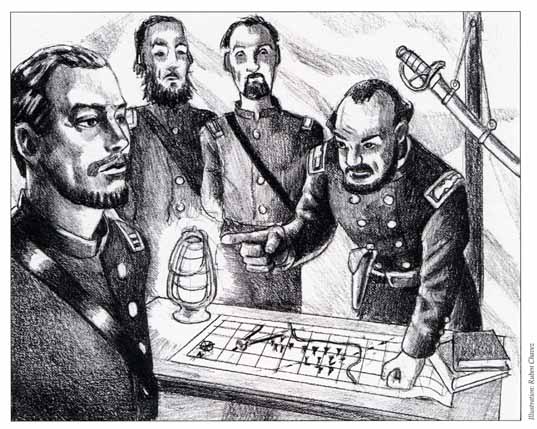
The Native connection
To Natives, the connection between America's values and the prison abuse at Abu Ghraib—along with the war on Iraq, the "war on terrorism," Vietnam and other imperialist wars, the Japanese American internment camps, lynchings of innocent blacks, various Indian massacres, and every other aspect of American history—is obvious. Several Natives address the issue below.
From the Grand Forks Herald:
Posted on Tue, May. 11, 2004
DORREEN YELLOW BIRD: Abuses of the present recall atrocities of the past
As pictures of the Iraqi prisoners unfolded across the nation like some salacious sex or sadomasochism magazine, the public is appalled and dumbfounded.
Not in America or by Americans, people say. But that's not true. We, in this country, have a history of killing for selfish and misguided reasons. A few days ago in heated conversation about the Iraqi prisoner abuses, I couldn't help but drift to an image of the massacre at Sand Creek on Nov. 29, 1864. Five hundred to 600 Cheyenne and Arapaho were killed by U.S. soldiers. Many of the victims were children or women. The soldiers scalped some of the victims. The men knocked the brains out of babies, and many women were cut into pieces and their bodies mutilated.
Correspondence from the massacre report that women's private parts were taken from dead bodies and carried into Denver for a gory "show and tell." The trophies were greeted with cheers and praise by the community.
Col. John M. Chivington, commander of the unit that attacked the Cheyenne and Arapaho, said this was an act of duty to themselves and to civilization. Chivington and his troops felt justified in killing innocent woman and children because the community thought of Native people as savages -- people who stood in the way of their way of life. So renegade warriors in that region retaliated by attacking settlers, killing and scalping them.
From reports, we now know the Native people at Sand Creek were innocent. They were living where the military told them they should live. John Smith, a U.S. Indian interpreter and special Indian agent, also lived with them. His testimony before Congress gave a vivid account of the massacre.
In the wars between the Native people and white soldiers, the U.S. troops had the advantage with more men and guns. When the tribes defended their land and retaliated to protect themselves, the military responded with force.
These people -- the Native tribes -- had offended them. So awful acts such as the Sand Creek massacre seemed justified. These people, after all, were "savages," as they were called by the government.
Has this kind of thinking pervaded some of American troops? The soldiers in this war constantly are reminded of the Sept. 11 attack, in which more than 3,000 people were killed. One of the barracks at the Abu Ghraib prison is named after a firefighter who died in that attack. Did the guards put the face of the attackers of the World Trade Center and the Pentagon on the Iraqis they detained?
During a Minnesota Public Radio broadcast Monday, a caller, responding to a conversation about the "abuses" in the Iraqi prison, said this is war. To get information about further attacks, this is the way it is done and the United States shouldn't have to apologize.
Hmm, I thought. I wonder what kind of information they gleaned from the female prisoner while they were raping her?
Treating your fellow man with justice and dignity is something we should have learned from the past atrocities committed against Native Americans. Those who have the authority and control need to be vigilant and remember these are our fellow men, regardless of the color of their skin.
If full attention isn't given to what happened at the Iraqi prison Abu Ghraib, the effects on America may be devastating. This administration needs to pay attention to history.
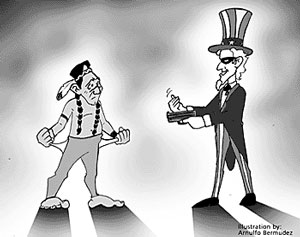
Newcomb: Reflecting on U.S. moral values and the Western Shoshone
Posted: May 21, 2004 -- 12:00pm EST
by: Steven Newcomb / Columnist / Indian Country Today
Recently published photos of Iraqis being abused, by an undetermined number of American GI's, has created an international furor. A U.S. army report prepared by Major General Antonio Taguba, refers to the "horrific" treatment of Iraqi men and women in U.S. military prisons in Iraq, most notoriously at Abu Ghraib.
Even U.S. senators, known for being quite measured in their word choices, are using words such as "disaster" to describe the long-term effect this raging controversy is likely to have on the world's perception of the United States. A May 5, New York Times editorial wrote, "the most enduring image of the occupation [of Iraq] may be those pictures of grinning American soldiers torturing Iraqi prisoners."
President Bush, appearing on Arab language television, referred to the treatment of Iraqi prisoners as "abhorrent." "This is a free country," said Bush,
"We do not tolerate this kind of abuses." [sic] The U.S. president further said that the people of Iraq "must understand what took place in that prison does not represent the America that I know."
U.S. officials understandably view the United States as a model civilization founded and built on an honorable system of morality. According to this point of view, the United States knows the difference between right and wrong, and behaves righteously the vast majority of the time.
However, this view of the United States only holds up if the history of the U.S.'s treatment of American Indians is given no place on the scale used to measure America's morality. One has only to think of the roughly 4,000 Cherokees who died on the thousand-mile forced march at American bayonet point along the Trail of Tears, or the photographs of Lakota ancestors murdered by the U.S. Army at the Wounded Knee Massacre, or the systematic slaughter of Native people in California in the mid to late 19th century to realize that, in terms of the U.S.'s treatment of Native nations, U.S. "morality" is not self-evident. Indeed, how does this history match up with President Bush's recent statement, "America is a compassionate country"?
Can a country that has been erected on more than two centuries of land thefts, and the forced removal of indigenous nations from their ancestral homelands, as well as an effort to destroy our respective languages and spiritual traditions, truly be a country erected on moral values and political values such as "freedom" and "justice?"
Given the lightning storm of controversy over events in Iraq, perhaps Congress will now make a concerted effort to demonstrate a willingness to treat American Indians on the basis of the moral values being so earnestly espoused by American officials.
U.S. tortures elicit painful memories in Indian country
Posted: June 01, 2004 -- 11:05am EST
by: Brenda Norrell / Southwest Staff Reporter / Indian Country Today
ALBUQERQUE, N.M. -- American Indians said apologies would not erase the tortures in Iraq and President Bush should be held responsible for leading America into a groundless war.
"It seems like white people are the worst savages," said Bessie Taylor, Navajo from Ch'ooshgai Mountain on the Navajo Nation in New Mexico.
After viewing the photograph of a female soldier holding a leash tied around the throat of a naked Iraqi, Taylor said the female soldier should be dragged in the same manner. "She probably doesn't know what it feels like to be tortured."
After Secretary of Defense Donald Rumsfeld apologized for the abuses in Iraq, Taylor said, "An apology is nothing. What does an apology do for you -- nothing."
Taylor said Bush, Vice President Dick Cheney and Rumsfeld should be held responsible for the tortures in Iraq. "They were so eager for this war, now look what has happened. President Bush is responsible for leading America into this war. He is responsible for this. This war was about oil and making Bush's friends rich."
Taylor questioned why the United States is fighting the war in Iraq, since there were no weapons of mass destruction and no links to those responsible for the attacks on 9/11.
Jose Garcia, Tohono O'odham from the border region of Sonora, Mexico, said, "Usually when the United States says it wants justice, it winds up doing the same thing it accuses the other country of doing." Garcia said torture and abuse is not just happening in Iraq.
Garcia pointed out that millions of dollars given by the United States to the government of Mexico to fight the so-called war on drugs is actually being used to torture and execute indigenous people in Mexico and elsewhere in Central and South America.
Garcia was a member of numerous indigenous human rights delegations to the highlands of Chiapas during the 1990s, when Mayans were being executed by the Mexican military with U.S.-issued ammunition.
"It still goes on today and not just in Chiapas. It happens in Brazil, Peru, Colombia and everywhere in Central and South America, where ever there is resistance to U.S. enterprises."
Garcia said there is no serious U.S. led "war on drugs." It is all politics and rhetoric. "Right now we see lots of drugs crossing into the United States. The ‘war on drugs' is just words." Residents living along the border from California to Texas, say drugs flow like water. In fact it is easier to find drugs than it is to find clean drinking water.
Taylor and Garcia, both indigenous elders, questioned if history would have been different if there had been photos and videos of the brutal tortures and executions of indigenous peoples in Central and South America. Since the 1970s, indigenous defending their land and families have been dismembered, raped, executed, their tongues cut out and others thrown from aircraft. The tortures and murders were carried out by Latin military officers trained at the U.S. School of the Americas in Fort Benning, Ga.
Torture and deception by those in power has been going on far longer.
"This oppression has been going on for 500 years. They have eliminated entire tribes over the years," Garcia said.
Renee Still Day, American Indian activist living in Pueblo, Colo., said Bush's war in Iraq has increased the risk of terrorism.
"We are in more danger from terrorism than ever before and the whole world hates our country with justification. Bush has put us in the most dangerous position we have ever been in."
Still Day said Bush should be held responsible for the tortures.
"I would certainly hold Bush responsible for the actions in the Iraqi prisons. His attitude and aggressive war stance paved the way for just such abuses. His ‘good old boy' way of doing things -- shoot now and ask questions later -- may have appealed to many right-wing conservatives, but I wonder now, how these good Christian people will explain away the atrocities committed by our own?
Still Day said racism and religious intolerance is the basis for the tortures and the legacy of U.S. oppression.
"For those who still consider themselves the ‘moral majority' and so righteous, how will they explain the widespread torture and murder of Iraqi prisoners at the hands of our troops? Is it because they aren't Christian, does that make them less than human in their eyes? That is certainly the rationale that was used when annihilating the indigenous peoples of this continent."
In Colorado, Denver police kept spy files on American Indian leaders, Indian attorneys, supporting senators and peace activists for 30 years. Now, she points out, the Patriot Act and Homeland Security threaten the fiber of American democracy and Americans rights to privacy and free speech.
"It seems whenever the tactics of this administration have been challenged, our civil liberties are denied. The administration openly threatens and attacks anyone who doesn't agree with Bush and they clearly abuse anyone who advocates for peace as ‘anti-American.'"
Still Day said the Bush administration would be cranking out its media spin, their manipulation and control of the facts, images and reactions.
"This is still an illegal war, going after Iraq was clearly the wrong move, since they had nothing to do with 9/11, nor did they have weapons of mass destruction. There is no good argument to support this president, but it will be interesting to see how creative their answers will be when they try to explain this one away. Who will they try to put the blame on this time?"
Still Day said instead of waiting for Bush's apology, Americans should go to the polls. "It will only stop with Bush, if we make it stop with him. If we, the people of this country are so blind and so completely absent of intelligence that we vote him back in office, then we get just what we deserve, four more years of mismanagement, abuse, torture and raping of this earth and its people."
After Rumsfeld's statement and apology concerning the tortures, Taylor said it is frightening to think of him in a decision-making role. She said the image of Americans has dipped to a new low around the world. "It is ruined and people will be afraid to travel to other countries now."
Taylor, however, thanked the media for exposing the truth in Iraq.
"You are real heroes. God bless. Whoever you are, good luck to you. Thank you for bringing us the real news again."
Rob's comment
Torturing and raping the earth...hmm. Apparently, Americans do to prisoners what they do to the people they conquer and to Mother Nature itself. You can find pictures of them posing with hunting trophies (e.g., the last remaining buffalo), lynching victims (e.g., blacks convicted of "fraternizing" with whites), and now Iraqis wrongly imprisoned as "terrorists."
In other words, another name for America's credo of progress is destruction. Another name for its can-do attitude is "the end justifies the means." Scary stuff if you're on the receiving end of the US's imperial power.
More examples of how prison abuse reflects America's values
Echoes of Abu Ghraib in Chicken Slaughterhouse: "When humans have unchecked power over those they see as inferior, they may abuse it."
More Native intelligence on foreign wars and conflicts
Native intelligence: the long view
The Indian-Iraqi connection
The Indian-Palestinian connection
Related links
A shining city on a hill: what Americans believe
America's exceptional values
America's cultural mindset
Readers respond
"The reason we are at war with Iraq and against Middle Eastern Islam extremist terrorists has nothing to do with what color they are...."
|
. . . |

|
All material © copyright its original owners, except where noted.
Original text and pictures © copyright 2007 by Robert Schmidt.
Copyrighted material is posted under the Fair Use provision of the Copyright Act,
which allows copying for nonprofit educational uses including criticism and commentary.
Comments sent to the publisher become the property of Blue Corn Comics
and may be used in other postings without permission.